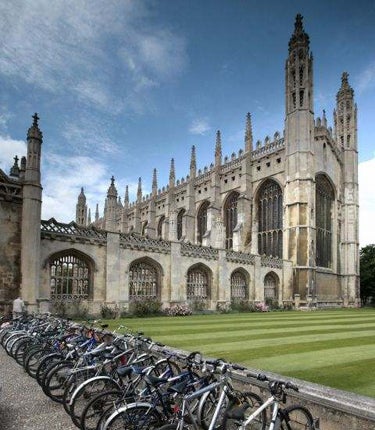Oxbridge squeeze on triple-A students
More than 12,000 applicants rejected after record surge in A-level results

Your support helps us to tell the story
From reproductive rights to climate change to Big Tech, The Independent is on the ground when the story is developing. Whether it's investigating the financials of Elon Musk's pro-Trump PAC or producing our latest documentary, 'The A Word', which shines a light on the American women fighting for reproductive rights, we know how important it is to parse out the facts from the messaging.
At such a critical moment in US history, we need reporters on the ground. Your donation allows us to keep sending journalists to speak to both sides of the story.
The Independent is trusted by Americans across the entire political spectrum. And unlike many other quality news outlets, we choose not to lock Americans out of our reporting and analysis with paywalls. We believe quality journalism should be available to everyone, paid for by those who can afford it.
Your support makes all the difference.Record numbers of pupils set to get three grade-A passes at A-level next week have been turned away from Britain's most elite universities.
Oxford and Cambridge experienced a large surge in applications for places, meaning that more than 12,000 students with three predicted top-grade passes have been left disappointed.
The situation is exacerbated at Cambridge because the university made fewer provisional offers this year; admissions officers believe an expected rise in A-grade passes for the 27th year in a row will mean that most candidates will be awarded their projected grades. The number of applications to Oxford has soared by more than 10 per cent from 13,388 in 2008 to more than 15,000. A spokeswoman said that home and overseas applications had increased. It had only made about 3,000 offers.
At Cambridge, applications have risen from 14,498 to 15,679, while the number of offers made has been cut from 4,066 to 4,016. The university said that attempts to widen participation and encourage more school leavers from disadvantaged homes to apply to elite universities was one reason for the increase in applications.
The university has remodelled its admissions system this year, scrapping the process of applying to individual colleges through separate application forms and the requirement for every candidate to have a languages GCSE.
Both these requirements were seen as hindering disadvantaged school leavers from applying to the university, especially now that so many state-school pupils, particularly in disadvantaged areas, have ditched languages since the Government made the subjects voluntary for 14- to 16-year-olds.
Academics worry that a year in which there has been a rise in applications from more disadvantaged school leavers could be accompanied by record rejections by Oxford and Cambridge, although the figures have not been broken down yet to show how many applicants from poorer backgrounds have been turned away.
Professor Alan Smithers, from the Centre for Education and Employment at the University of Buckingham, said: "It is good more people are applying but it does signify the need for an examination that can distinguish the most talented. At the moment it doesn't look as if the A grade does that."
Phil Willis, the Liberal Democrat chairman of the Commons select committee which monitors universities, said: "There needs to be a better approach to admissions which does not solely rely on A-levels but looks at other factors."
Last year it was estimated about 12,000 pupils with three straight As were rejected and experts say that figure will rise by as many as 500 this year.
The trend could be mirrored at other elite universities, with top-performing candidates struggling to gain places. One leading academic said: "In past years, universities have managed to find places for candidates who just miss out on their provisional offer [getting, say, two As and a B instead of three As]. I'm not sure that will happen this year."
Geoff Parks, the head of admissions at Cambridge University, said: "I would be surprised if we didn't set a new record [for three-A rejections]."
About 25 per cent of past applicants have been from overseas students which, if that trend continues, would mean about 21,000 home applicants this year. The percentage of overseas students accepted tends to drop as many have to choose between Cambridge, Oxford or a top US university.
About 6,000 places are available for home students at Cambridge and Oxford, meaning up to 15,000 home applicants will have been rejected.
The rise in applications coupled with the increase in the number projected to get three grade-A passes has made it the hardest year yet for admissions officers seeking to recruit the most talented school leavers to popular courses such as law and medicine.
However, it is predicted next year that performance could drop for the first time in more than two decades.
In 2000, Laura Spence was rejected from Oxford University despite attaining three As at A-level, only to be accepted at Harvard, in the US.
Questions are to be made harder next year to test critical thinking skills and an A* grade will also be on offer.
"I wouldn't be totally surprised if [the percentage of scripts awarded A grades] did go down next year," said Dr Parks. "I think it will take some time for teachers and students to adapt to the new changes."
Cambridge is also recognising the A* grade by making its standard offer two grade As and an A* grade pass. The pressure on admissions officers to select the brightest candidates should ease but critics fear the changes could benefit independent over state schools with private school teachers more likely to coach pupils to achieve A* grades.
Next year's shake-up might help A-levels to fight off challenges from rival qualifications such as the Pre-U, on the grounds that it is based on more traditional lines with increased emphasis on the end-of-course exam.
Join our commenting forum
Join thought-provoking conversations, follow other Independent readers and see their replies
Comments